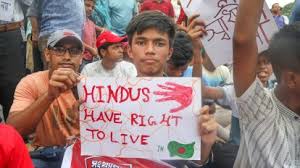
In recent weeks, Tripura has seen a surge in public unrest and political discourse surrounding the escalating violence in Bangladesh. As protests continue to erupt in neighboring Bangladesh, there has been growing clamour within Tripura for a coordinated Indo-Bangla response to address the situation. The rising calls for joint action between India and Bangladesh reflect the deepening concerns over regional stability and the impact of the violence on local communities.
Table of Contents
The Background: Violence in Bangladesh
The violence in Bangladesh, which began as a series of clashes between different groups, has escalated into widespread unrest. The conflict has been marked by violent confrontations, attacks on religious and ethnic minorities, and significant property damage. Reports of arson, looting, and assaults have alarmed both local and international observers.
The Protests in Tripura: A Response to Regional Instability
Tripura, a northeastern state in India that shares a border with Bangladesh, has been significantly affected by the unrest across the border. The violence in Bangladesh has spilled over into Tripura, where local communities have expressed their concerns and frustrations through protests and demonstrations.
The protests in Tripura have been driven by several factors:
- Concerns Over Regional Security: Many residents and local leaders are worried about the potential spillover of violence into Indian territory. The proximity to the Bangladesh border has heightened fears of unrest affecting Tripura directly.
- Humanitarian Concerns: There is a strong sense of solidarity with those affected by the violence in Bangladesh. Many protesters are motivated by a desire to offer support and advocate for the protection of vulnerable populations.
- Political Tensions: The situation has also become a focal point in local and national politics, with various political parties and leaders using the issue to mobilize support and criticize the handling of the crisis by both Indian and Bangladeshi authorities.
The Call for Indo-Bangla Joint Action
As the protests in Tripura have gained momentum, there has been increasing pressure on both the Indian and Bangladeshi governments to take coordinated action to address the crisis. The clamor for Indo-Bangla joint action reflects a growing belief that a collaborative approach is necessary to restore peace and stability in the region.
Several key aspects of the call for joint action include:
- Increased Diplomatic Engagement: There is a demand for intensified diplomatic efforts between India and Bangladesh to address the root causes of the violence and to work towards a peaceful resolution. This includes dialogue at the highest levels of government and the involvement of international mediators if necessary.
- Enhanced Border Security: Given the proximity of Tripura to the violence in Bangladesh, there are calls for increased security measures along the border to prevent the spillover of violence. This includes better coordination between Indian and Bangladeshi border forces and the implementation of enhanced monitoring systems.
- Humanitarian Assistance: There is a push for a joint effort to provide humanitarian aid to those affected by the violence in Bangladesh. This includes support for refugees and displaced individuals, as well as assistance to local organizations working on the ground to provide relief.
Political and Social Reactions
The call for Indo-Bangla joint action has elicited a range of reactions from political leaders, activists, and the general public in Tripura and beyond.
- Political Leaders: Many political leaders in Tripura have voiced their support for joint action, emphasizing the need for a united approach to address the crisis. Some have criticized the Indian government for not doing enough to address the situation and have called for a more proactive stance in diplomatic negotiations.
- Activists and Civil Society: Human rights activists and civil society organizations have been vocal in advocating for humanitarian assistance and solidarity with those affected by the violence. They have organized rallies and campaigns to raise awareness and mobilize support for both immediate relief efforts and long-term solutions.
- The General Public: The general public in Tripura has expressed a mixture of concern, frustration, and solidarity. Many are deeply affected by the images and reports coming from Bangladesh and are calling for meaningful action to address the crisis and prevent further escalation.
The Way Forward: Challenges and Opportunities
The call for Indo-Bangla joint action presents both challenges and opportunities for addressing the crisis in Bangladesh and its impact on Tripura.
Challenges:
- Political Complexities: The political dynamics within both India and Bangladesh can complicate efforts to achieve joint action. Differences in national interests, political priorities, and domestic issues may impact the effectiveness of collaborative efforts.
- Logistical and Operational Issues: Implementing joint security measures and humanitarian assistance requires coordination and resources. Ensuring that these efforts are executed effectively and efficiently is a significant challenge.
Opportunities:
- Strengthening Bilateral Relations: The crisis presents an opportunity for India and Bangladesh to strengthen their bilateral relations through collaborative problem-solving and mutual support. Successful joint action could pave the way for improved cooperation on other issues.
- Building Regional Stability: Addressing the violence in Bangladesh through joint action can contribute to broader regional stability. It demonstrates a commitment to peaceful resolution and the protection of human rights, setting a positive precedent for future conflicts.
Conclusion: A Call for Unity and Action
The escalating violence in Bangladesh and the subsequent protests in Tripura have highlighted the urgent need for Indo-Bangla joint action. As the situation continues to unfold, there is a growing recognition of the importance of a collaborative approach to restore peace and stability in the region.
The call for joint action reflects a deep concern for regional security and humanitarian issues, as well as a desire to see meaningful and effective responses from both governments. While challenges remain, the opportunity for constructive engagement and cooperation exists, offering a path forward that can benefit both nations and contribute to a more stable and peaceful South Asia.








